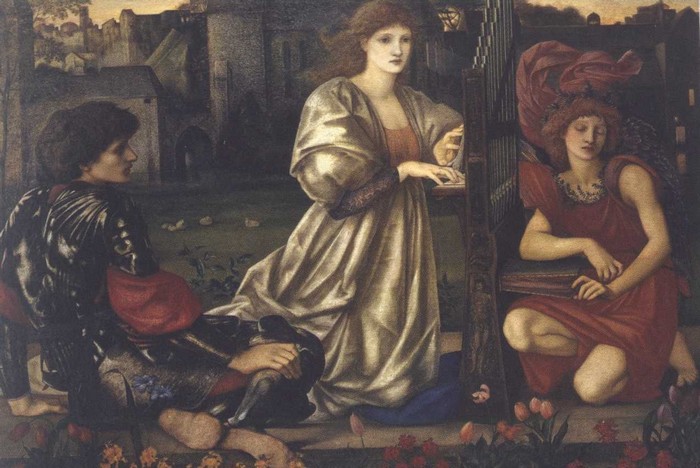FROM ‘SONNETS FROM THE PORTUGUESE’
FROM ‘SONNETS FROM THE PORTUGUESE’
I
I thought once how Theocritus had sung
Of the sweet years, the dear and wished-for years,
Who each one in a gracious hand appears
To bear a gift for mortals, old or young:
And, as I mused it in his antique tongue,
I saw, in gradual vision through my tears,
The sweet, sad years, the melancholy years,
Those of my own life, who by turns had flung
A shadow across me. Straightway I was ’ware,
So weeping, how a mystic Shape did move
Behind me, and drew me backward by the hair;
And a voice said in mastery, while I strove, —
‘Guess now who holds thee?’ — ‘Death,’ I said. But, there,
The silver answer rang, — ‘Not Death, but Love.’
III
Unlike are we, unlike, O princely Heart!
Unlike our uses and our destinies.
Our ministering two angels look surprise
On one another, as they strike athwart
Their wings in passing. Thou, bethink thee, art
A guest for queens to social pageantries,
With gages from a hundred brighter eyes
Than tears even can make mine, to play thy part
Of chief musician. What hast thou to do
With looking from the lattice-lights at me,
A poor, tired, wandering singer, singing through
The dark, and leaning up a cypress tree?
The chrism is on thine head, — on mine, the dew, —
And Death must dig the level where these agree.
XIV
If thou must love me, let it be for nought
Except for love’s sake only. Do not say,
‘I love her for her smile — her look — her way
Of speaking gently — for a trick of thought
That falls in well with mine, and certes brought
A sense of pleasant ease on such a day’ —
For these things in themselves, Beloved, may
Be changed, or change for thee, — and love, so wrought,
May be unwrought so. Neither love me for
Thine own dear pity’s wiping my cheeks dry, —
A creature might forget to weep, who bore
Thy comfort long, and lose thy love thereby!
But love me for love’s sake, that evermore
Thou mayst love on, through love’s eternity.
XXI
Say over again, and yet once over again,
That thou dost love me. Though the word repeated
Should seem ‘a cuckoo song,’ as thou dost treat it,
Remember, never to the hill or plain,
Valley and wood, without her cuckoo-strain
Comes the fresh Spring in all her green completed.
Beloved, I, amid the darkness greeted
By a doubtful spirit-voice, in that doubt’s pain,
Cry, ‘Speak once more — thou lovest!’ Who can fear
Too many stars, though each in heaven shall roll,
Too many flowers, though each shall crown the year?
Say thou dost love me, love me, love me — toll
The silver iterance! — only minding, Dear,
To love me also in silence with thy soul.
XXIV
Let the world’s sharpness, like a clasping knife,
Shut in upon itself and do no harm
In this close hand of Love, now soft and warm,
And let us hear no sound of human strife
After the click of the shutting. Life to life —
I lean upon thee, Dear, without alarm,
And feel as safe as guarded by a charm
Against the stab of worldlings, who if rife
Are weak to injure. Very whitely still
The lilies of our lives may reassure
Their blossoms from their roots, accessible
Alone to heavenly dews that drop not fewer,
Growing straight, out of man’s reach, on the hill.
God only, who made us rich, can make us poor.
XXVI
I lived with visions for my company
Instead of men and women, years ago,
And found them gentle mates, nor thought to know
A sweeter music than they played to me.
But soon their trailing purple was not free
Of this world’s dust, their lutes did silent grow,
And I myself grew faint and blind below
Their vanishing eyes. Then thou didst come — to be,
Beloved, what they seemed. Their shining fronts,
Their songs, their splendours (better, yet the same,
As river-water hallowed into fonts),
Met in thee, and from out thee overcame
My soul with satisfaction of all wants:
Because God’s gifts put man’s best dreams to shame.
XLIII
How do I love thee? Let me count the ways.
I love thee to the depth and breadth and height
My soul can reach, when feeling out of sight
For the ends of Being and ideal Grace.
I love thee to the level of every day’s
Most quiet need, by sun and candle-light.
I love thee freely, as men strive for Right;
I love thee purely, as they turn from Praise.
I love thee with the passion put to use
In my old griefs, and with my childhood’s faith.
I love thee with a love I seemed to lose
With my lost saints — I love thee with the breath,
Smiles, tears, of all my life! — and, if God choose,
I shall but love thee better after death.

Sir Edward Coley Burne-Jones THE LOVE SONG Oil on canvas. 1868–1877 The Metropolitan Museum of Art, New York City
Эдуард Коули Бёрн-Джонс ЛЮБОВНАЯ ПЕСНЬ Холст, масло. 1868–1877 Музей Метрополитен, Нью-Йорк
Более 800 000 книг и аудиокниг! 📚
Получи 2 месяца Литрес Подписки в подарок и наслаждайся неограниченным чтением
ПОЛУЧИТЬ ПОДАРОК